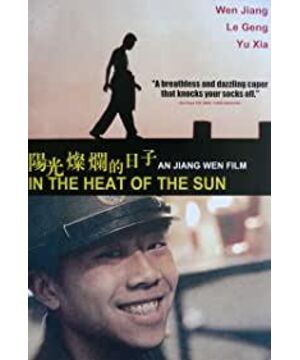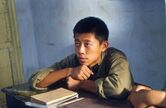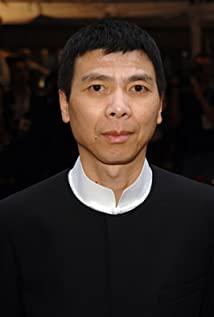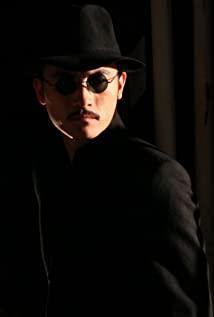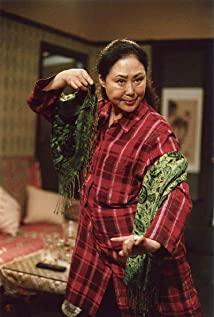"Sunny Days", I think it must be full of joy and joy, love and hate of a generation, or rather, this is a film about memories. So when it came out in 1995, it immediately became the box office champion of the year. I can even imagine that the cinema is full of people who have lost their youth. During the film, they slowly meditated and reminisced about their youth. That time is gone forever, but it is like a bride with a veil - at the most dramatic moment, she will vigorously lift it up and reveal its face completely in front of her.
The most impressive scene in the movie is when Ma Xiaojun jumped off the high platform and was pushed into the water again and again by his former friends. About that open-air pool, the open-air jump, I always feel like part of my childhood memories. It is said that the plot of this part of the film comes from a real event during the Cultural Revolution. A 14-year-old boy jumped from a swimming pool in a military compound in the western suburbs of Beijing one night, but he did not know what was in the swimming pool. Without water, he was thrown to death. In fact, there is such an open-air swimming pool in my very vague childhood memory. I remember seeing a lot of teenagers who were much older than me jumping off the platform, but when I grew up, I looked for this swimming pool based on my memory. , only to find that it no longer exists, or at least never existed - everyone told me that I don't remember such an open-air pool. And this became an eternal mystery growing up in me, and I would have no way of verifying its authenticity. It's like Ma Xiaojun in the movie - even though we are in different eras and have different backgrounds.
But if it is said that Ma Xiaojun on the platform has crossed the biggest hurdle in his life with repeated jumps and struggles, then this also means that he has finally stepped out of the period of hormonal flying. The days of surging lust, contradictions, and suffering have finally passed. The "Milan" standing on the high altar in his heart also fell abruptly, and was replaced by an ordinary, secular, powerful, and even lowly "Milan" who could never be linked to the goddess. And this is what Ma Xiaojun told me about the most brutal growing up memory of that generation.
Besides that, I have to say. The film "Sunny Day" even subverted all my fantasies about the previous generation. I have imagined the youth of their generation countless times, and I think their youth must be like puppets produced on the assembly line - no features, everyone is the same. But when I walked into the summer of Ma Xiaojun and his group of friends, I found that the youth of this era has the same dynamic color as the youth of our post-80s and post-90s. This kind of youth fascinates me even more than what I'm experiencing right now. They are just as naive, as incomprehensible to the world, and as conscientiously confused and restless in the face of their own physical and psychological growth, dutifully acting as caged beasts in lust.
In fact, I also love the swear words spoken by teenagers in the courtyard, and the adult world they excavated for me - condoms in books, leaders watching porn, crazy father and mother love... This makes me Knowing that the youth we are also experiencing is actually no different from the youth of the 1970s - at most, it is just a change of soup instead of medicine. The exploration of the adult world is just a cycle of reincarnation in the rumbling history. Those youths who shout "idiot" but can't understand its true meaning will leave, but its departure is accompanied by the fact that one day, you, or you, will say "idiot" only after you have that realization. Its departure is the moment when the beast you desire in your heart finally breaks out of the cage and rams through the world naked.
A lot of details and little people in the movie also won my heart. I can say that because of their presence makes this movie really "sunny". For example, the fool who has become a classic image on the screen, such as the old-fashioned teacher played by Feng Xiaogang, such as the senior army cadre, are all alive and kicking. Of course, I don't want to miss the praise of director Jiang Wen and screenwriter Wang Shuo. It is because of this movie that I completely gave up the actor Jiang Wen in my mind and truly admired his talent. As my title says, this movie fulfills all my 70s fantasies. Moreover, the fantasy it gave me about that era was very beautiful and very disillusioned.
Changes in society may be the most brutal experience for a generation, and it is also the moment when a person's values are subverted. At the end of the movie, the compound where the teenagers run and play is gone, replaced by a group of people who have grown up and grown old, who are wandering in Beijing in a Xue Fulai car. At this time, the film changed from color to black and white, as if to remind us that those vivid times in our mind belong to the past era, and it is even more dazzling than today, until that time is still Only after the idiot riding the broom made a strong sound of "idiot" in the passionate shout of "Glenmu", we were pulled back to reality.
Writing this, I think I've poured out all my love for those people of that era. Of course, what I can't ignore is that the generation I love has not in fact passed away slowly in the long river of history - they have now become our fathers, yes, they were used by us with "dreary, daring" "Small, limited, and peaceful" labels to define the parents. For the era, for the time, and for the imprint on a generation, it is always an eternal issue. Even I still can't understand why our parents seem to have nothing in common with the teenagers who volatilized their youth hormones in the 1970s, so that I can't connect them in the eternal time and memory. But perhaps, my impression of Ma Xiaojun's generation itself has been altered and full of fabrications, as if I can't be sure whether the swimming pool in my childhood memory really exists. Our imagination and expectations are still there. Reality is always intricately intertwined and mixed in the flesh-and-blood era, wandering enthusiastically in our souls. Or maybe, like us, those parents who we are all too familiar with will repeatedly question their youthful years in their minds, but they will choose to fill the most memories in their memory when they are watching their own old age. A healthy and beautiful figure - Milan, or Yu Beibei, or someone else, and then tell the legend to our generation.
And what the real 1970s, which was forever written in the water, looked like was irrelevant. I'm not going to get to the bottom of it, and I'm sure you won't either. I would rather leave my thoughts to this era that Ma Xiaojun told me.
View more about In the Heat of the Sun reviews


